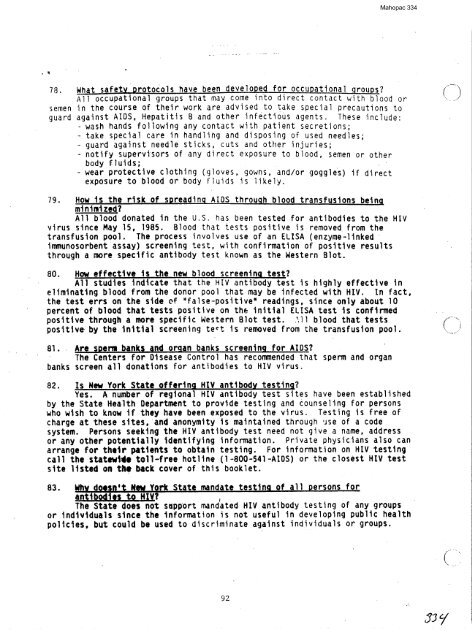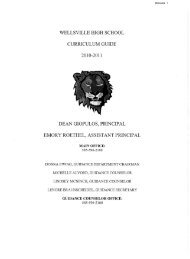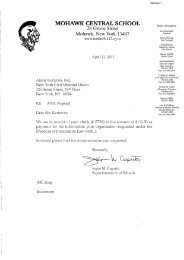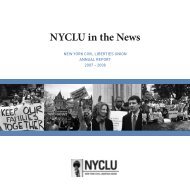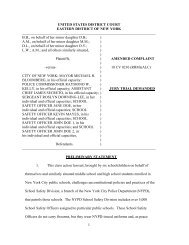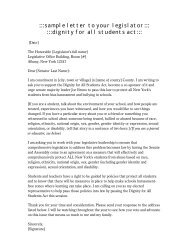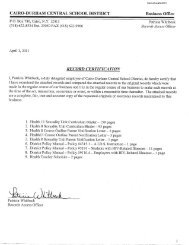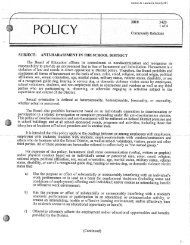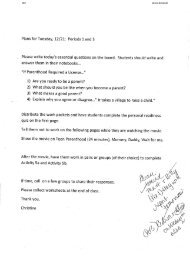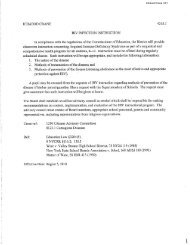- Page 1 and 2:
Mahopac 001 NYCLU NEW YORK CIVIL LI
- Page 3 and 4:
" r : - ~. c. . . ' . '..... ,.,' \
- Page 5 and 6:
Mahopac 005 Family Life and Sexual
- Page 7 and 8:
Mahopac 007 Family Life and Sexual
- Page 9 and 10:
Mahopac 009 Family Life and Sexual
- Page 11 and 12:
____ o Mahopac 011 Family Life and
- Page 13 and 14:
Mahopac 013 Family Life and Sexual
- Page 15 and 16:
Mahopac 015 Female Silhouette Name:
- Page 17 and 18:
.... ö: o~ / Mahopac 017 Family Li
- Page 19 and 20:
Mahopac 019 Contraceptive Method: W
- Page 21 and 22:
Mahopac 021 AdHYity 69 ·1 IlY cg;e
- Page 23 and 24:
Mahopac 023 Adu'¥'U:y '11 M!:J Cir
- Page 25 and 26:
Mahopac 025 Sexual As s au ; t !lI
- Page 27 and 28:
Mahopac 027 ,SEX SMART fOR TEENS: S
- Page 29 and 30:
Mahopac 029 Family Life and Sexual
- Page 31 and 32:
Mahopac 031 IEYiJUI!Jlóil!'fJ;ü©
- Page 33 and 34:
Mahopac 033 -------_.- Comrnunicabl
- Page 35 and 36:
Mahopac 035 'Teen da.-ting abuse. H
- Page 37 and 38:
Mahopac 037 Family Life and Sexual
- Page 39 and 40:
Mahopac 039 ~atli!llle: ,.~~- JB{01
- Page 41 and 42:
i.• Mahopac 041 t" r Relationship
- Page 43 and 44:
Mahopac 043 J / /1 ;' ,fl .. ' Du'r
- Page 45 and 46:
..... - --.---- -- -.--.- - --. -'_
- Page 47 and 48:
Mahopac 047 ., ~,:' 'I' r'lenatche
- Page 49 and 50:
Mahopac 049 H;lfIiflC·t)- ... Thj,
- Page 51 and 52:
Mahopac 051 25 THINGS YOU SHOULD KN
- Page 53 and 54:
Mahopac 053 25 THINGS YOU SHOULD KN
- Page 55 and 56:
I' Mahopac 055 25 THINGS YOU SHOULD
- Page 57 and 58:
Mahopac 057 ETR Associates (Educati
- Page 59 and 60:
Mahopac 059 PUBLISHER'S NOTE (.' r~
- Page 61 and 62:
Mahopac 061 ...--------------------
- Page 63 and 64:
Mahopac 063 PREFACEAND ACKNOWLEDGME
- Page 65 and 66:
Mahopac 065 c,' { (, ) (" " '",' .:
- Page 67 and 68:
Mahopac 067 '-""--- ( " ' .... I IN
- Page 69 and 70:
Mahopac 069 (, ) skills training (B
- Page 71 and 72:
Mahopac 071 ( P R lOR TO INITIATING
- Page 73 and 74:
Mahopac 073 ( .. ./ 3. Teasing, put
- Page 75 and 76:
Mahopac 075 Prepare for the Class 8
- Page 77 and 78:
Mahopac 077 ( .. ) ABSTINENCE, SEX
- Page 79 and 80:
Mahopac 079 ( The play is called Le
- Page 81 and 82:
Mahopac 081 (, ) l O. Ask volunteer
- Page 83 and 84:
Mahopac 083 Lee and Lee # l TEACHER
- Page 85 and 86:
Mahopac 085 ( Directions: Copy and
- Page 87 and 88:
Mahopac 087 ( ALTER.NATE ),11, , !i
- Page 89 and 90:
Mahopac 089 pass the virus to their
- Page 91 and 92:
Mahopac 091 10. Ask the students: a
- Page 93 and 94:
Mahopac 093 Lee and Lee # IH TEACHE
- Page 95 and 96:
Mahopac 095 WORKSHEET 1.2H ( "" ) M
- Page 97 and 98:
Mahopac 097 ;r' OUTLINE OF I . Acti
- Page 99 and 100:
Mahopac 099 it." Not talking about
- Page 101 and 102:
Mahopac 101 the endurance of love b
- Page 103 and 104:
Mahopac 103 Lee and Lee #2 TEACHER
- Page 105 and 106:
Mahopac 105 REFUSALS SYNOPSIS Class
- Page 107 and 108:
Mahopac 107 talking and listening t
- Page 109 and 110:
Mahopac 109 I 5. Then have the same
- Page 111 and 112:
" Mahopac 111 tIlUMiè.WUtU\. ;j.l
- Page 113 and 114:
Mahopac 113 ROLE PLAY 3.3 Setting t
- Page 115 and 116:
Mahopac 115 n~~ La;. g- 1L:..5..t&
- Page 117 and 118:
Mahopac 117 LJ USING REFUSAL SKILLS
- Page 119 and 120:
Mahopac 119 2. In the full group, r
- Page 121 and 122:
II I, Iil Ii! IIII I' il " l' II I
- Page 123 and 124:
Mahopac 123 ROLE PLAY 4.3 At a Part
- Page 125 and 126:
Mahopac 125 /P..s- ,~ -., /,- ( ) \
- Page 127 and 128:
Mahopac 127 Demonstrate and Practic
- Page 129 and 130:
Mahopac 129 ROLE PLAY 5.2 Presents
- Page 131 and 132:
Mahopac 131 Name: -----------------
- Page 133 and 134:
Mahopac 133 ( ,! OUTLINE OF I Activ
- Page 135 and 136:
Mahopac 135 o . You are alone with
- Page 137 and 138:
Mahopac 137 ( \, ) NOTE TO THE TEAC
- Page 139 and 140:
" Mahopac 139 WORKSHEET 6.2 Name --
- Page 141 and 142:
Mahopac 141 ", i ( '\'0' GETTING AN
- Page 143 and 144:
Mahopac 143 information when they d
- Page 145 and 146:
Mahopac 145 Minor side effects may
- Page 147 and 148:
Mahopac 147 Risks and disadvantages
- Page 149 and 150:
"m'~.NWWIi1_W. _IIIIIIlI'¡¡" Il P
- Page 151 and 152:
Mahopac 151 ( PREPARATION • For v
- Page 153 and 154:
Mahopac 153 When condoms don't work
- Page 155 and 156:
Mahopac 155 " ( .) If students are
- Page 157 and 158:
Mahopac 157 ) lesson Summary' Remin
- Page 159 and 160:
" Mahopac 159 HOMEWORK 8.2 Name _ T
- Page 161 and 162:
Mahopac 161 HANDOUT 8.4 How Is HIV
- Page 163 and 164:
Mahopac 163 ( OUTLINE OF I Activity
- Page 165 and 166:
" Mahopac 165 Protection: Myths and
- Page 167 and 168:
Mahopac 167 W'\VLIl:. 1l""J!.J4> U
- Page 169 and 170:
Mahopac 169 TIo -', .- ( ) ' SKILLS
- Page 171 and 172:
Mahopac 171 4. Have a volunteer fro
- Page 173 and 174:
Mahopac 173 GROUP HANDOUT 10.2 Situ
- Page 175 and 176:
Mahopac 175 ROLlE PLAY 10.4 A Small
- Page 177 and 178:
Mahopac 177 ~ \ iI, Å lJ SKILLSINT
- Page 179 and 180:
(\,_ .I Mahopac 179 WORKSHEET 11.1
- Page 181 and 182:
Mahopac 181 t'UHM 11.3 Name: _ Date
- Page 183 and 184:
Mahopac 183 .;;~' ·':~~t 'lY' i; a
- Page 185 and 186:
Mahopac 185 .,,."f!!IJ :jj';f ~~~.
- Page 187 and 188:
Mahopac 187 ~tf 7''l' i;: !, " IV.
- Page 189 and 190:
Mahopac 189 ~r·¡.' !-. "" ~'~ :,.
- Page 191 and 192:
Mahopac 191 HIV RISK BEHAVIORS SYNO
- Page 193 and 194:
Mahopac 193 2. Organize students in
- Page 195 and 196:
Mahopac 195 HIV Risk Behaviors TEAC
- Page 197 and 198:
Mahopac 197 TI~ IMPLEMENTING FROM S
- Page 199 and 200:
Mahopac 199 sian that might occur i
- Page 201 and 202:
Mahopac 201 WORKSHEET 14.1 STEP 2:
- Page 203 and 204:
Mahopac 203 c ,) I Activity 1 l OUT
- Page 205 and 206:
Mahopac 205 " ( 'v. ) Leave space f
- Page 207 and 208:
Mahopac 207 Sticking with Abstinenc
- Page 209 and 210:
Mahopac 209 IM ~; % *', ~. r- f ,.
- Page 211 and 212:
Mahopac 211 () Option: Have student
- Page 213 and 214:
Mahopac 213 WORKSHEET 16.2 , - ( ;
- Page 215 and 216:
Mahopac 215 IFORM '116.4 í .. I Ob
- Page 217 and 218:
Mahopac 217 Standard I-Personal Hea
- Page 219 and 220:
Mahopac 219 Standard I-Personal Hea
- Page 221 and 222:
Mahopac 221 Standard I-Personal Hea
- Page 223 and 224:
Mahopac 223 Standard 2-A Safe and H
- Page 225 and 226:
Mahopac 225 Standard 2-A Safe and H
- Page 227 and 228:
Mahopac 227 Standard 2-A Safe and H
- Page 229 and 230:
Mahopac 229 Standard 3-Resource Man
- Page 231 and 232:
Mahopac 231 Standard 3-Resource Man
- Page 233 and 234:
Mahopac 233 Standard 3-Resource Man
- Page 235 and 236:
20 Mahopac 235
- Page 237 and 238:
Mahopac 237 (-- ". AIDS PREVENTION
- Page 239 and 240:
Mahopac 239 (. ADMINISTRATION J.e.:
- Page 241 and 242:
Mahopac 241 .r Foreword (" . . . .
- Page 243 and 244:
Mahopac 243 Introd uction It it the
- Page 245 and 246:
Mahopac 245 r- \'- (~~ There are ma
- Page 247 and 248:
!~\ ~ r \ Mahopac 247 WAYSIN WHICH
- Page 249 and 250:
Mahopac 249 ( '~.. PROGRAM COMPONEN
- Page 251 and 252:
Mahopac 251 ( HOW TO USE THIS GUIDE
- Page 253 and 254:
Mahopac 253 PATTERN OF LESSON DEVEL
- Page 255 and 256:
o' Mahopac 255 Lesson 2 Grade K ( O
- Page 257 and 258:
Mahopac 257 Lesson 1 Grade 1 Object
- Page 259 and 260:
Mahopac 259 Lesson 3 Grade 1 ( Obje
- Page 261 and 262:
Mahopac 261 Lesson 1 Grade 2 I (" O
- Page 263 and 264:
Mahopac 263 Lesson 3 Grade 2 Object
- Page 265 and 266:
Mahopac 265 Lesson 1 Grade 3 Object
- Page 267 and 268:
Mahopac 267 Lesson 3 Grade 3 ( Obje
- Page 269 and 270:
Mahopac 269 ( PATTERN OF LESSON DEV
- Page 271 and 272:
Mahopac 271 Cont'd ....Lesson 1 Gra
- Page 273 and 274:
Mahopac 273 ( " Lesson 3 Grade 4 Ob
- Page 275 and 276:
Mahopac 275 Lesson 1 Grade 5 Object
- Page 277 and 278:
Mahopac 277 ( Lesson 3 Grade 5 Obje
- Page 279 and 280:
---'\ 1\ -~ Mahopac 279 PATTERN OF
- Page 281 and 282:
CHAIN OF INFECTION Mahopac 281 i."
- Page 283 and 284: Mahopac 283 ( Lesson 1 Grade 6 Obje
- Page 285 and 286: Mahopac 285 ( Lesson 3 Grade 6 Obje
- Page 287 and 288: Mahopac 287 ( Lesson 5 Grade 6 Obje
- Page 289 and 290: Mahopac 289 ( Lesson 7 Grade 6 Obje
- Page 291 and 292: Mahopac 291 ( Lesson 9 Grade 6 Obje
- Page 293 and 294: Mahopac 293 . SPECTRUM OF HIV INFEC
- Page 295 and 296: Mahopac 295 ( \ Lesson 2 Grade 7-8
- Page 297 and 298: Mahopac 297 ( EXPECTED INSTRUCTIONA
- Page 299 and 300: Mahopac 299 rC - ( Lesson 1 High Sc
- Page 301 and 302: Mahopac 301 ( Lesson 3 High School
- Page 303 and 304: Mahopac 303 ( \ Lesson 5 High Schoo
- Page 305 and 306: Mahopac 305 ( TEACHER NOTES DEFINIT
- Page 307 and 308: Mahopac 307 ( \. (._~ TRANSMISSION
- Page 309 and 310: Mahopac 309 SPECTRUM OF HIV INFECTI
- Page 311 and 312: Mahopac 311 ( ( Incidence Since the
- Page 313 and 314: ~, Mahopac 313 /' ( MAJOR RISK FACT
- Page 315 and 316: Mahopac 315 :' .- ~ ( How the vi.rw
- Page 317 and 318: (v. Mahopac 317 ( the following ite
- Page 319 and 320: Mahopac 319 ( AIDS MYTH-FACT SHEET
- Page 321 and 322: Mahopac 321 ( Questions and Answers
- Page 323 and 324: Mahopac 323 cts eeses that can be t
- Page 325 and 326: Mahopac 325 (", . 26. Can you get A
- Page 327 and 328: Mahopac 327 ( c'.. ,.. 41. How many
- Page 329 and 330: Mahopac 329 (' (. 53. What;s ARC? A
- Page 331 and 332: Mahopac 331 ( 67. What r1skdoes mix
- Page 333: Mahopac 333 ( (. c o . reconmended
- Page 337 and 338: Mahopac 337 ( ( Human Rights Issues
- Page 339 and 340: Mahopac 339 c-· THE UNIVERSITY OF
- Page 341 and 342: Mahopac 341 THE UNIVERSITY OF THE S
- Page 343 and 344: Mahopac 343 ( Foreword c ( The Rege
- Page 345 and 346: Mahopac 345 ( Introduction c_ ( . A
- Page 347 and 348: ,-- r>; (\ Health Education --- Con
- Page 349 and 350: Mahopac 349 ( PROGRAM COMPONENTS TH
- Page 351 and 352: Mahopac 351 Planning, Implementing,
- Page 353 and 354: Mahopac 353 ( c, c " the most rece
- Page 355 and 356: Mahopac 355 ( , (- ( K-12 suggests
- Page 357 and 358: Mahopac 357 ( ( ( , The lessons in
- Page 359 and 360: Mahopac 359 ( A Family Life Approac
- Page 361 and 362: Mahopac 361 ( Integrating Values c,
- Page 363 and 364: Mahopac 363 ( øÆ1&:'@!WÆm'4ffim~
- Page 365 and 366: Mahopac 365 ( If}wmi,tfØß.GW..dtm
- Page 367 and 368: Mahopac 367 ( LESSON2 Grades 1(..3
- Page 369 and 370: Mahopac 369 LESSON 3 Grades K-3 Obj
- Page 371 and 372: Mahopac 371 ( Teacher Notes on Less
- Page 373 and 374: Mahopac 373 ( LESSON4 Grades K-3 Ob
- Page 375 and 376: Mahopac 375 ( TeacherNotes on.Lesso
- Page 377 and 378: Mahopac 377 ( Teacher Notes onLesso
- Page 379 and 380: Mahopac 379 c LESSON6 Grades K-3 ':
- Page 381 and 382: Mahopac 381 ( LESSON7 Grades K-3 Ob
- Page 383 and 384: Mahopac 383 c LESSON 8 Grades 1.(-3
- Page 385 and 386:
, r>. Mahopac 385 ~'. PATTERN OF LE
- Page 387 and 388:
Mahopac 387 ( Teacher Notes on Less
- Page 389 and 390:
Mahopac 389 ( CHAIN OF INFECTION .I
- Page 391 and 392:
Mahopac 391 ( \ LESSON9 Grades 4-6
- Page 393 and 394:
Mahopac 393 The B-cells manufacture
- Page 395 and 396:
Mahopac 395 ( THE IMMUNE SYSTEM INF
- Page 397 and 398:
Mahopac 397 ( Teacher Notes on Less
- Page 399 and 400:
Mahopac 399 ( AIDS MYTH-FACT SHEET
- Page 401 and 402:
Mahopac 401 ( LESSON 11 Grades 4-6
- Page 403 and 404:
Mahopac 403 V family Life Education
- Page 405 and 406:
Mahopac 405 WAW.m';:;m:mWfM$:m;tJ,w
- Page 407 and 408:
Mahopac 407 ( ". Decision Making St
- Page 409 and 410:
Mahopac 409 ( Values Integration Re
- Page 411 and 412:
Mahopac 411 ( Teacher Notes on Lese
- Page 413 and 414:
Mahopac 413 ( Teacher Notes on Less
- Page 415 and 416:
Mahopac 415 c Teacher Notes on Less
- Page 417 and 418:
Mahopac 417 c Teacher Notes on Less
- Page 419 and 420:
Mahopac 419 ( LESSON18 Grades 4-6 O
- Page 421 and 422:
Mahopac 421 ( Teacher Notes on Less
- Page 423 and 424:
Mahopac 423 ( SPECTRUM OF HIV INFEC
- Page 425 and 426:
Mahopac 425 - ( Teacher Notes on Le
- Page 427 and 428:
Mahopac 427 ( Answers to AIDS MYTH~
- Page 429 and 430:
Mahopac 429 ( Teacher Notes on Less
- Page 431 and 432:
Mahopac 431 ( LESSON21 Grades 7-8 O
- Page 433 and 434:
Mahopac 433 ( Syllabus Connection I
- Page 435 and 436:
Mahopac 435 c Positive Health Behav
- Page 437 and 438:
" Mahopac 437 ( LESSON 23 Grades 7-
- Page 439 and 440:
Mahopac 439 ( Teacher Notes on Less
- Page 441 and 442:
Mahopac 441 c LESSON24 Grades 7-8 O
- Page 443 and 444:
Mahopac 443 ,- ( Teacher Notes on L
- Page 445 and 446:
Mahopac 445 ( Positive Health Behav
- Page 447 and 448:
Mahopac 447 ( Values Integration Re
- Page 449 and 450:
Mahopac 449 ( Teacher Notes on Less
- Page 451 and 452:
Mahopac 451 c LESSON27a Grades 7-8
- Page 453 and 454:
Mahopac 453 c c Teacher Vocabulary
- Page 455 and 456:
Mahopac 455 ( Positive Health Behav
- Page 457 and 458:
0 r, 1 (""" Mahopac 457 focuses on
- Page 459 and 460:
Mahopac 459 C· ( Teacher Vocabular
- Page 461 and 462:
Mahopac 461 \ ,. ( LESSON 28 Grades
- Page 463 and 464:
Mahopac 463 ( AIDS MYTH-FACT SHEET
- Page 465 and 466:
Mahopac 465 ( LESSON29 Grades 9-12
- Page 467 and 468:
Mahopac 467 ( OJ .j. Teacher Notes
- Page 469 and 470:
Mahopac 469 w:%>*m~Æf$**m;w.ø'&':
- Page 471 and 472:
Mahopac 471 c LESSON 31 Grades 9-12
- Page 473 and 474:
Mahopac 473 LESSON 32 Grades 9-12 (
- Page 475 and 476:
Mahopac 475 Students will match the
- Page 477 and 478:
Mahopac 477 ( !JESSON 33 Grades 9-1
- Page 479 and 480:
Mahopac 479 c Teacher Notes on Less
- Page 481 and 482:
(", r\ I FAMILYRESPONSIBILITIES (Sa
- Page 483 and 484:
Mahopac 483 ( Positive Health Behav
- Page 485 and 486:
Mahopac 485 - ( Syllabus Connection
- Page 487 and 488:
Mahopac 487 (- Decision Making Stud
- Page 489 and 490:
Mahopac 489 c ( Teacher Vocabulary
- Page 491 and 492:
Mahopac 491 c &w.J..m:?@::f.#.N_~Æ
- Page 493 and 494:
Mahopac 493 ( LESSON 36b Grades 9-1
- Page 495 and 496:
Mahopac 495 c Sexual abstinence - N
- Page 497 and 498:
Mahopac 497 - ( IJESSON 36c , Grade
- Page 499 and 500:
Mahopac 499 ( c (I Screening cannot
- Page 501 and 502:
Mahopac 501 ( Appendix ( c- S'of
- Page 503 and 504:
Mahopac 503 EDUCATION LAW ARTICLE 1
- Page 505 and 506:
Mahopac 505 COMMISSiONER'S REGULATI
- Page 507 and 508:
Mahopac 507 Appendix B SampleAdoles
- Page 509 and 510:
Mahopac 509 Appendix C Information
- Page 511 and 512:
Mahopac 511 I/} more years to appea
- Page 513 and 514:
Mahopac 513 tant community institut
- Page 515 and 516:
Mahopac 515 New York State HIV Coun
- Page 517 and 518:
Mahopac 517 Immunization - A method
- Page 519 and 520:
Mahopac 519 I EDUCATION t;... ·•
- Page 521 and 522:
Mahopac 521 December 1987 AIDS Educ
- Page 523 and 524:
Mahopac 523 .r-. ¡ \.L) December 1
- Page 525 and 526:
Mahopac 525 ([') ~j December 1987 A
- Page 527 and 528:
Mahopac 527 ~ö o ~~ m s: ~5 () »
- Page 529 and 530:
Mahopac 529 \ -- --I ,-ta -, 00- (5
- Page 531 and 532:
Mahopac 531 3. CONSIDER the consequ
- Page 533 and 534:
i_::!! Mahopac 533 CJ1 • O o m c
- Page 535 and 536:
Mahopac 535 o co () • s:(J) · o
- Page 537 and 538:
Mahopac 537 • • Ö' ..., I I --
- Page 539 and 540:
Mahopac 539 • • 5~ ~ o;- ~. ~ =
- Page 541 and 542:
\ t ~\ Mahopac 541 Sexually Transmi
- Page 543 and 544:
Mahopac 543 , , • Syphilis - bact
- Page 545 and 546:
Mahopac 545 • Genital Warts • S
- Page 547:
I .,. Mahopac 547 Herpes Simplex II


